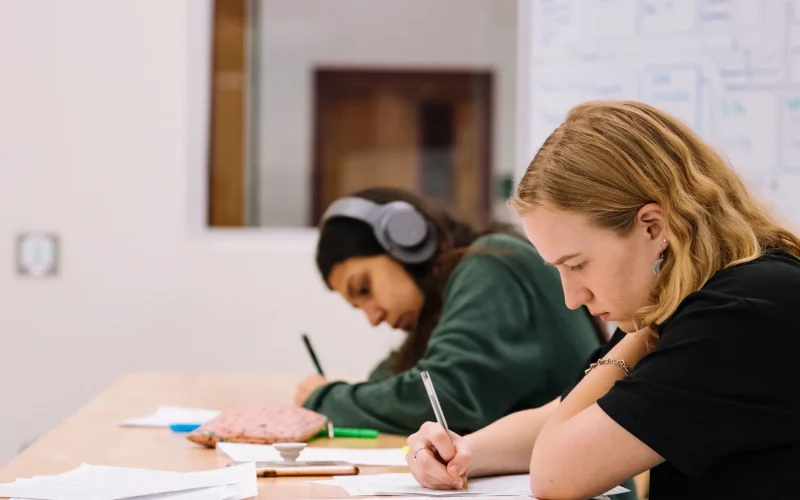The idea of revision can cause anxiety and confusion when students are under pressure to meet academic standards.
On the other hand, for students preparing to tackle their A-levels and GCSEs, many useful revision techniques work and have produced noticeable results.
Keeping in mind that everyone has a unique learning style, this article presents 15 tried-and-true revision techniques that will help you ace your exams. If you are a visual or auditory learner, there’s a technique for you.
So, if you’re here searching for strategies that work, you’re in the right place. Read on!
Table of contents
- When to revise for A-levels and GCSEs
- Where to revise for A-levels and GCSEs
- 15 Best revision techniques for A levels & GCSEs
- #1. Create a study schedule:
- #2. Active note-taking:
- #3. Flashcards:
- #4. Mind mapping:
- #5. Practice past papers:
- #6. Group study:
- #7. Teaching others:
- #8. Use online resources
- #9. Breaks and rewards:
- #10. Active learning:
- #11. Practice mindfulness:
- #12. Variety in resources:
- #13. Self-quizzing:
- #14. Chunking:
- #15. Healthy lifestyle:
- FAQs
- Conclusion
- References
- Recommendations
When to revise for A-levels and GCSEs
The timing of your A-Level and GCSE revision can significantly impact your success. Ideally, you should start early, giving yourself several months to prepare. A well-structured revision plan that spans the academic year is ideal.
Begin by breaking down your subjects into manageable chunks, setting aside specific days or hours for each. This gradual approach eases the burden and allows you to revisit topics, reinforcing your understanding.
As the exams draw nearer, intensify your efforts with more focused and frequent revision. Remember, consistency is key.
Avoid last-minute cramming, as it can lead to stress and hinder retention. A well-paced, early start will help you absorb and retain information effectively, increasing your chances of achieving your desired results.
Read: When Should You Start Revising For Your A-Levels Exam?
Where to revise for A-levels and GCSEs
Selecting the right place to revise for your A-Levels and GCSEs is crucial for productivity and concentration. Firstly, find a quiet and comfortable spot free from distractions. Your bedroom or a dedicated study area works well. Ensure good lighting and ventilation for a pleasant environment.
Libraries are another excellent option. They offer a focused atmosphere and access to study resources. Coffee shops, if not too noisy, can work for some.
Online resources are invaluable but choose wisely to avoid distractions. Digital platforms like Khan Academy, YouTube, or educational apps can supplement your revision.
Remember, the best place to be is one where you can stay focused and organized. Experiment with different locations to see what works best for you.
Related Article: Top 15 Best Online GCSE Courses in 2024
15 Best revision techniques for A levels & GCSEs
Here are 15 effective revision techniques for A-Levels and GCSEs:
#1. Create a study schedule:
Develop a study timetable that outlines when and what you’ll study. Allocate specific time slots for each subject and stick to your schedule. This structured approach helps you cover all your subjects systematically.
Here’s a sample of what an organized study schedule looks like:
Monday:
- 9:00 AM – 11:00 AM: Mathematics
- 11:30 AM – 1:30 PM: English Literature
- 2:00 PM – 4:00 PM: Biology
Tuesday:
- 9:00 AM – 11:00 AM: Chemistry
- 11:30 AM – 1:30 PM: History
- 2:00 PM – 4:00 PM: Physics
Wednesday:
- 9:00 AM – 11:00 AM: Geography
- 11:30 AM – 1:30 PM: Economics
- 2:00 PM – 4:00 PM: French
Thursday:
- 9:00 AM – 11:00 AM: Psychology
- 11:30 AM – 1:30 PM: Art & Design
- 2:00 PM – 4:00 PM: Religious Studies
Friday:
- 9:00 AM – 11:00 AM: Spanish
- 11:30 AM – 1:30 PM: Business Studies
- 2:00 PM – 4:00 PM: Music
Saturday:
- 9:00 AM – 11:00 AM: Review and revise Mathematics
- 11:30 AM – 1:30 PM: Review and revise English Literature
- 2:00 PM – 4:00 PM: Review and revise Biology
Sunday:
- 9:00 AM – 11:00 AM: Review and revise Chemistry
- 11:30 AM – 1:30 PM: Review and revise History
- 2:00 PM – 4:00 PM: Review and revise Physics
#2. Active note-taking:
When reviewing your notes, don’t just passively read them. Actively engage with the material by summarizing key points, highlighting important information, and writing down explanations for complex concepts. This practice reinforces your memory.
Active note-taking involves more than skimming through the text. It entails highlighting the most significant information and even outlining the explanation of complex ideas. That way, you improve your understanding of the topic.
#3. Flashcards:
Flashcards are a powerful tool for memorization. Create flashcards with questions or terms on one side and answers or definitions on the other. Use them for quick self-quizzing to enhance recall.
By using flashcards regularly, students improve their ability to quickly retrieve knowledge while developing a deeper understanding of the material.
#4. Mind mapping:
Mind maps are visual representations of information. They help you organize complex topics by connecting related ideas and concepts. This technique is excellent for understanding the relationships between different pieces of information.
Also, read: How Many Hours of Revision A Day For A Levels
#5. Practice past papers:
Past exam papers are a goldmine for revision. Solve these papers under timed conditions to simulate the exam environment. This not only helps you become familiar with the exam format but also assesses your knowledge and identifies weak areas.
#6. Group study:
Collaborative study sessions with peers can be beneficial. Discussing topics with others allows you to gain different perspectives and explanations.
The group can stay on topic by having clear objectives for each study session and assigning roles such as a discussion leader or timekeeper.
However, ensure that the group remains focused and doesn’t turn into a social gathering.
#7. Teaching others:
Teach a friend, a family member, or even an imaginary audience about a particular topic. Explaining a concept to someone else forces you to truly understand it and strengthens your memory of it.
#8. Use online resources
Take advantage of online educational resources. Platforms like YouTube, Khan Academy, Duolingo, and Quizlet offer interactive lessons, quizzes, and practice exercises that can supplement your revision.
#9. Breaks and rewards:
Studying for long stretches can lead to burnout and reduced focus. Incorporate regular short breaks into your study sessions to recharge. Additionally, set small rewards for yourself after achieving specific study goals to stay motivated.
#10. Active learning:
Actively engage with the material by solving problems, answering questions, and participating in discussions. This method pushes students to think critically, apply the material in various settings, and express their views clearly, which results in a higher degree of comprehension.
Active participation helps you obtain a better understanding of the subject matter, strengthen your analytical skills, and cultivate critical thinking.
Read: How to Sit For GCSE Exams Privately: The Extensive Guide
#11. Practice mindfulness:
Integrate mindfulness techniques into your study routine. Simple practices like deep breathing or short meditation sessions can reduce stress, enhance concentration, and improve overall well-being.
#12. Variety in resources:
Use a variety of learning resources, including textbooks, online articles, videos, podcasts, and lecture notes. Diverse sources provide different perspectives and can help reinforce your understanding.
#13. Self-quizzing:
Regularly quiz yourself on the material you’ve covered. This self-assessment helps you identify areas that need further revision and solidifies your knowledge.
#14. Chunking:
Divide complex subjects or topics into smaller, manageable chunks. Focus on one chunk at a time to make learning and retention more manageable and effective.
Also, read: How To Make A-Level Revision Timetable (That Actually Works)
#15. Healthy lifestyle:
Maintain a balanced diet, get regular exercise, and ensure you get enough sleep. A healthy body and mind are essential for effective revision. Good nutrition, physical activity, and sufficient rest can improve your cognitive function and overall well-being during the revision period.
FAQs
The best revision method for GCSEs varies by individual learning style, but effective techniques include active note-taking, regular self-quizzing, past paper practice, and a well-organized study schedule.
Four months can be sufficient for GCSE revision if you have a well-structured study plan and focus consistently. However, starting earlier may provide a more comfortable preparation period.
It’s advisable to start revising for GCSEs several months before the exams, ideally around January or February, to allow ample time for thorough preparation.
Conclusion
These 15 revision techniques are tried-and-true methods that can significantly enhance your A-Level and GCSE preparation. Remember, the key is consistency and finding what works best for you. With dedication and smart revision, success is within reach. Happy studying!
References
- thinkstudent.co.uk – Revision Techniques For GCSE & A-Level
- lovelearningtutors.com – How to revise for (and ace) your GCSE, IGCSE, A Level and IB exams
- lifemoreextraordinary.com – How to revise effectively for GCSE and A Levels






